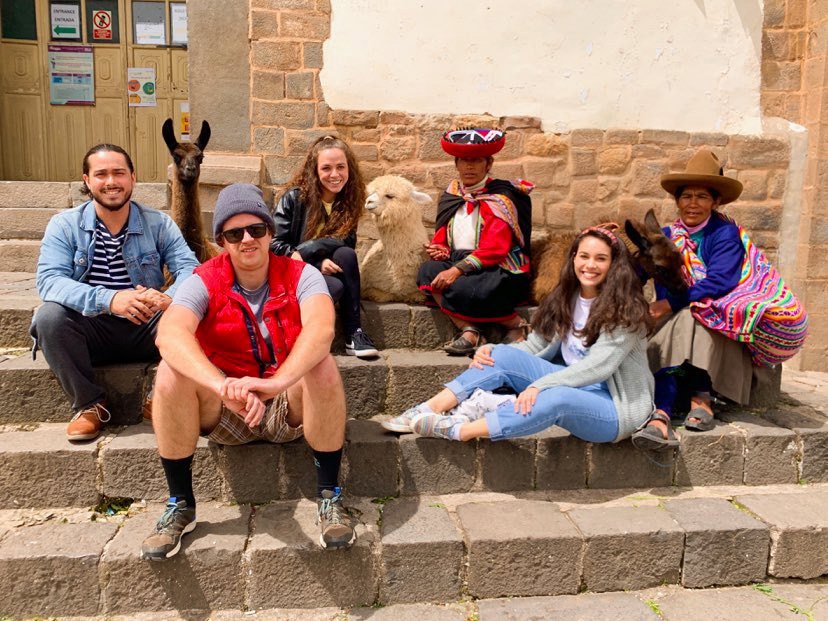Connected by CHSS: How COVID-19 Impacted a Rowan Faculty Member and Alumni While Traveling Abroad
Connected by CHSS: How COVID-19 Impacted a Rowan Faculty Member and Alumni While Traveling Abroad
Connected by CHSS: How COVID-19 Impacted a Rowan Faculty Member and Alumni While Traveling Abroad
COVID-19 has reached many communities forcing school closures, lockdowns and mandatory quarantine periods across the globe. As officials around the country work to reopen, respond to an increase in cases in dozens of states, and anticipate the fall influenza season, CHSS in particular has felt the effects of the pandemic as some of our alumni and faculty have personally dealt with it from recovering from the virus to not being able to immediately travel home while being abroad early in the pandemic. These stories demonstrate the strength and resilience of the CHSS community in the face of adversity and how in many ways the college has been an asset to their everyday lives.
Emily Blanck
Professor Emily Blanck of Interdisciplinary Studies travelled to Bolivia on March 12 to help her daughter shoot a film highlighting a climate change organization called “Friends Bilingual Center”. The following week the Bolivian government enforced a strict curfew that eventually led to flights leaving later that week being cancelled. As a result, they were both under strict stay-at-home orders in an AirBnB in Santa Cruz for an additional week. They were able to travel home and made it back to New Jersey safely on March 28 per a charter flight from the U.S. Embassy.
Here are some of her thoughts reflecting on the experience:
“It was stressful because we just didn’t know when or what was going to happen. Just the uncertainty of it all. We were lucky that we had an AirBnB to stay in that had wifi and it was safe. But it was not comfortable and we wanted to be home. Going a whole week without a shower was not good,” she recounted.
However, she credits those close to her for doing all that could to get them home safely. Family and friends were reaching out to senators and congresspeople to gain support for them. In particular, her daughter’s connection to a person who works at the Embassy through WhatsApp allowed them to communicate with them about getting a flight home when normally getting in touch with the Embassy can be a challenge.
“Also, for me there was a language barrier but for Julia there wasn’t. She was just a rock. She was amazing. It was good to have someone who is fluent in Spanish go through things such as emails from the travel agency regarding charter flights. I think we both supported each other but I think she really supported me especially with the language aspect,” Blanck added.
After returning home, Blanck’s main concern was wrapping up the coursework for the semester and making sure her students were supported during this time.
“Mostly what I’ve been able to do with the Interdisciplinary Center is tie up all of the loose ends and try to figure out the basics. Most of my priorities have been just trying to find ways to make the transition to teaching online as smooth and as easy as possible for the students,” she added.
Marie DiLeonardo
On March 2, CHSS alumni Marie DiLeonardo travelled to Lima, Peru with her boyfriend and a couple of others for a vacation. This was her fourth time in Peru and she was quite familiar with the country as she’s vacationed there before and has done volunteer opportunities there as well. The group’s trip was going smoothly until the government announced Peru’s first confirmed case of COVID-19 on March 8. The group was originally supposed to leave on March 16 however the Peruvian borders closed a day prior therefore cancelling their flight home.
This forced the group to stay in Peru under the government's enforcement of martial law. They were able to leave on April 6 and return back home to New Jersey. She relied on her fluency in Spanish from her degree in the language and her daily use of it to relay any important information to the rest of the group.
“Being fluent in Spanish was crucial not just because of the news but also it’s hard to navigate in a place where you don’t speak the language on a regular basis. But especially when there’s army tanks and people with their guns drawn everywhere. So it was definitely important because they stop you and ask a lot of questions. I was able to explain that we have passports, we’re going to this grocery store, etc.,” she added.
She estimates that the four of them were part of a group of 9,000 to 10,000 Americans who had faced similar circumstances as them in Peru. However, through daily emails from the Embassy she notes that around 8,000 people were able to return home.
This experience was eye-opening for DiLeonardo who better understands the global pandemic having seen first hand how another country is handling it. It also has allowed her to really take it more seriously than if she was only seeing its effects in the U.S.
“My only other reflection would be a shout out to all of my Spanish professors at Rowan in the Foreign Languages Department and for really making us have conversations and try new things and travel. So thank you to them as well,” she concluded.
Alexandria Brooks is a 2020 Rowan graduate with a degree in journalism. She was a CHSS public relations intern, who regularly contributed content and articles about CHSS.




